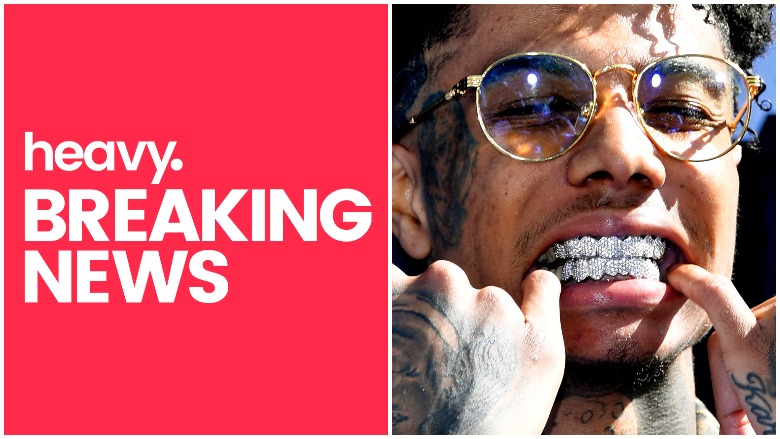
Getty
Blueface is not dead. The Los Angeles-based rapper, whose real name is Johnathan Michael Porter, has been the victim of various death hoaxes since December 2018.
A fake story from December 2018 said that the rapper was shot by rival gang members in the abdomen and the left rib and was left to bleed out on the floor of his apartment. Another, from April 2019 said that Blueface found unresponsive in his home in Calabasas at 5:39 a.m. following a suspected opioid overdose.
The homepage for the website that has been circulating the fake stories includes a disclaimer, “Create A Prank & Trick Your Friends.” The disclaimer also reads, “We do NOT support FAKE NEWS!!! This is a Prank website that is intended for Fun. Bullying, Violent Threats or posts that Violate Public Order are NOT permitted on this Website.”
Blueface Remains Active on His Social Media Pages, Proving He’s Alive & Well
There are no credible reports of Blueface’s demise and at the time of writing, the rapper has been extremely active in posting on his Instagram page.
Since those headlines were in the news, Blueface has attracted a lot of criticism after he threw cash to homeless people in Los Angeles’ Skid Row. In November 2018, Blueface was involved in an incident when a man tried to rob him at a Chevron gas station. Blueface is accused of firing at the man. The rapper was arrested in February 2019 in relation to the incident after he accused of being in possession of an unregistered gun.
Death Hoaxes Continue to Be Prevalent in the Social Media Age
Death hoaxes are hugely common in the internet age. In March 2014, ABC News published a guideline for internet users in order to help them to avoid falling for death hoaxes. At that time, a common death hoax suggested that various celebrities, including Jeff Goldblum and The Rock had died after falling from some cliffs in New Zealand. The ABC article pointed out that readers should be eagle-eyed for “bait text.” “Bait text” is something that seems interesting but has been used multiple times in multiple other fake stories.
While a Washington Post article on the same topic encouraged users to stick to known websites and noted that, “Breaking news stories will usually include the reporter’s name; hoaxes, mysteriously, go un-bylined.”
In 2014, The Week published a list of hoax sites. They included, Empire News, The National Report, Huzlers, Daily Currant and Free Wood Post. The website noted that occasionally news stories from satire sites such as The Onion and Clickhole are circulated as legitimate news. The Week article concludes simply that users should, “Take 30 seconds to determine whether something is real before you blast it out to hundreds of people. We’ll all have a better internet for it.” Buzzfeed’s Craig Silverman, a specialist in fake news, told DigiDay in 2012, “Fake news relies on viral sharing. If you think about why so many stars are subject to death hoaxes, they’ve been part of a pop culture that people have an emotional connection to. And that is at the core of what makes fake news work.”
Also in 2014, a digital media professor at Indiana University, Mark Bell, told the New York Times that part of the reason for the prevalence of death hoaxes is that “People like to lie. They get a thrill from it. There is a little hit of dopamine when you lie, especially a lie that is believed by somebody else.” While the Independent rationalized that the popularity for the stories was simply “because people want to read them.” Mark Bell also said of the phenomenon, “There’s not a lot of cost, either financially, morally, legally or criminally in doing this.”
READ NEXT: Teenage Porn Star Controversy Rocks California High School
Comments
Blueface Not Dead: ‘Respect My Cryppin’ Rapper Is Alive